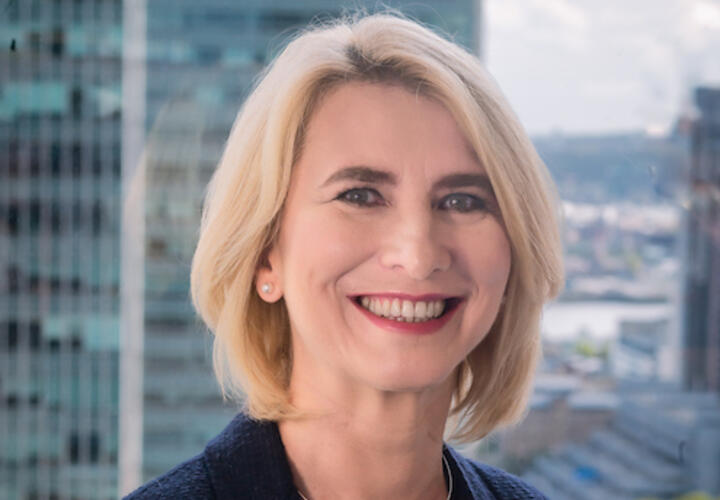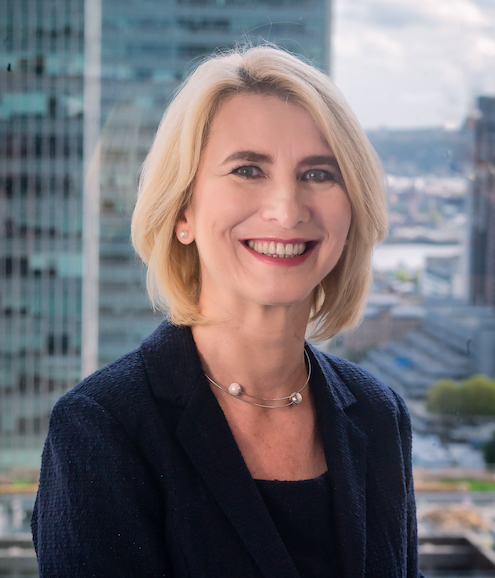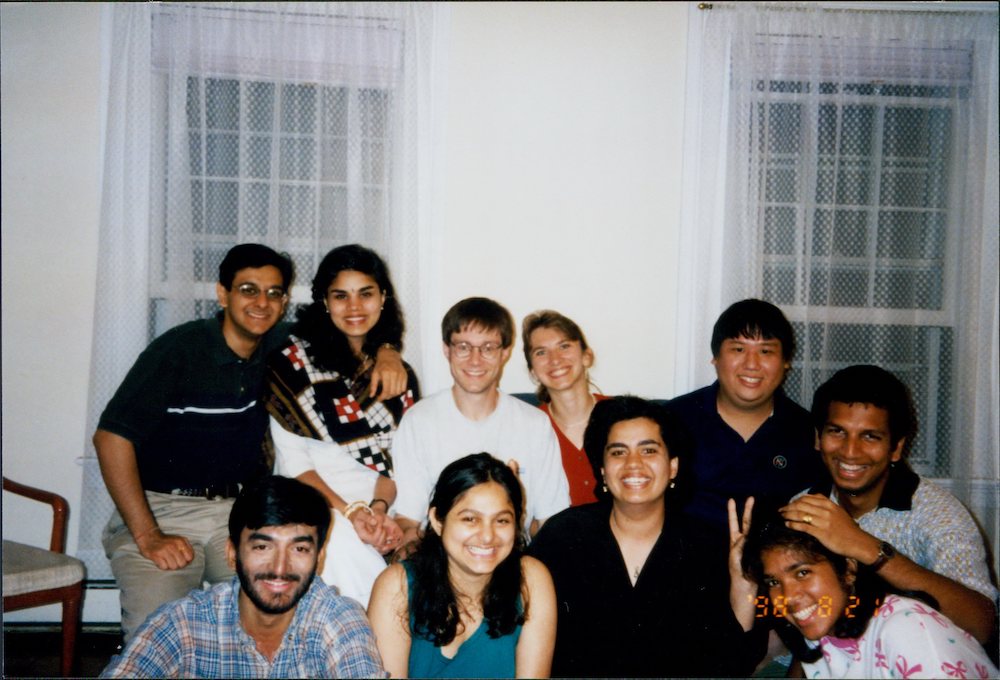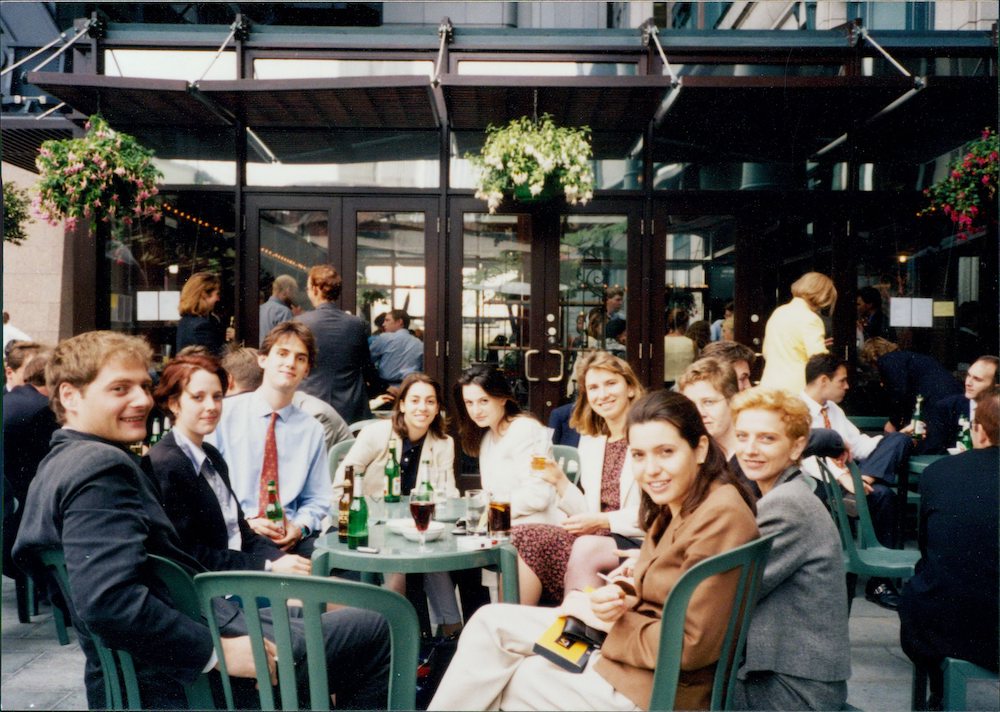Beata Javorcik: from a Yale PhD to becoming Oxford’s first female Statutory Professor of Economics
The Chief Economist of the European Bank for Reconstruction and Development looks back on her childhood in socialist Poland and a path-breaking career of research and policy efforts to support countries’ transition to market-based economies.

Growing up in Kraków in the 1970s and 80s, Beata Javorcik remembers the vivid symbols of communism: sparsely stocked grocery shelves, long queues to obtain rationed goods, and the challenges of everyday life in Soviet-era Poland. But she also remembers a lesson her dziadek (Polish for grandfather) taught her: that education can open paths to a different future.
Several decades later, that lesson has come full circle for Javorcik, who received her PhD in economics from Yale in 1999. She is now the Chief Economist of the European Bank for Reconstruction and Development (EBRD) – an institution established after the fall of the Soviet Union to help countries transition from communism to free-market capitalism.

But the EBRD is only the latest job for Javorcik, a world-renowned scholar of international trade. In 2014, she became Oxford University’s first female Statutory Professor of Economics. Through it all, she has stayed true to her dziadek’s lesson – by using research and analysis to help countries chart better futures.
From Kraków to Rochester
At an early age, Javorcik noticed contradictions in Poland’s communist system. For example, despite the government’s emphasis on equality, certain groups enjoyed privileges – like her high school in Kraków, where the mayor’s daughter attended. The school received many benefits as a result of this connection, including one that changed the course of Javorcik’s life: an exchange program with a high school in Rochester, New York.
Javorcik arrived in the US shortly before the fall of the Berlin Wall. In sharp contrast to Kraków’s central planning and conservative style, Rochester was dynamic and bustling. Yet both cities grappled with economic dislocation: as Kraków began its long transition from communism to capitalism, Rochester was struggling to find its footing after decades of industrial decline.
Fascinated by these issues, Javorcik knew what she wanted to study after high school, when she arrived at the University of Rochester on a scholarship for international students.
“I wanted to study economics in order to make sense of all of the changes that were happening,” she said.

Javorcik graduates from University of Rochester in 1994.
Eager to connect her studies with practical experience, Javorcik even took a summer internship at the World Bank’s country office in Warsaw. But after graduating from college, she knew her career prospects would be limited in Poland. So she opted to stay in the United States and pursue a PhD in economics at Yale – an institution known and admired in Kraków. Despite being one of only three women in her PhD cohort, Javorcik quickly found her footing in New Haven.
“We ate, breathed, and dreamed about economics,” she said. She remembers spending entire days chipping away at math problems on Hillhouse Avenue, then chewing them over all evening with her housemates – and often over breakfast muffins at Willoughby’s the next morning, too.
Given her background, Javorcik’s doctoral studies focused on understanding the drivers of economic transition. Studying international trade and development economics with Yale luminaries like T.N. Srinivasan, Phil Levy, Jenny Lanjouw, and Andrew Bernard, her dissertation was based on transition data from Eastern Europe. She even spent a summer in London interning with the EBRD’s Chief Economist – a position she’d hold two decades later.
Pioneering women at EGC and Yale Economics
Learn more about the outstanding lives and careers of women who helped found EGC and Yale Economics – and demanded greater equality in the profession.
From policy to academia…
After completing her PhD, Javorcik had tenure-track academic offers as well as opportunities to work at major development institutions. But ultimately, her heart lay in policy.
“When she received multiple offers on the job market, she called me almost in a panic – asking ‘What do I do?’” recalled Andrew Bernard, one of her Yale advisors who is now the Kadas T'90 Distinguished Professor at Dartmouth College’s Tuck School of Business. “And I said, ‘Well, what’s your dream job?’ And she said, ‘I’d love to do economics research at the World Bank.’”
In 1999, Javorcik joined the World Bank’s Young Professionals program. One of her first roles at the World Bank was Country Economist for Azerbaijan, a former Soviet state undergoing transition. She later moved to the Bank’s research department, where she could do more rigorous analytical work. Increasingly, she became interested in the complex effects of foreign direct investment (FDI) in transition countries.

Javorcik (back row, center) with Yale classmates and friends in 1998.
At the time, many transition countries sought investments from large multinational firms with the hope that their technical knowledge would “spill over” to local firms and boost domestic productivity. But Javorcik suspected that FDI spill-overs were less likely to occur within industries (since firms lacked incentive to share knowledge with local competitors) than across industries (between a foreign firm and their local suppliers, for example). Javorcik illustrated this dynamic in a 2004 paper on FDI in Lithuania in the American Economic Review, which ultimately influenced the prevailing wisdom on FDI among economists and policymakers alike.
Inspired by the paper’s impact, the concept of usefulness became Javorcik’s lodestar. Regardless of job title or organizational affiliation, what really mattered to her was the ability to produce insightful (and perhaps even surprising) research on topics that were relevant to policymakers. Around the same time, academia and Europe beckoned her home: in 2007, she took up a faculty position at Oxford University.
With colleagues like Peter Neary and Tony Venables, Javorcik helped nurture a world-class trade economics group at Oxford. Her research agenda focused on answering useful questions – often centred on when, where, and how transition countries can make the most of international trade, from services liberalization in the Czech Republic to whether bringing FDI can help countries increase quality of their exports.
In 2014, these efforts paid off. Javorcik was promoted to a Statutory Professorship – the first woman in the history of Oxford’s economics department to earn that title.
…And back again
Javorcik’s career came full circle in 2019: she was appointed Chief Economist of the EBRD, where she’d interned as a PhD student – and where the concept of economic transition is still a guiding principle.
Of course, much has changed since 1997. For one thing, the EBRD’s definition of transition has broadened to include priorities like competitiveness, integration, equity, resilience, and sustainability. Likewise, the EBRD has expanded its regional scope, particularly into Turkey and the South and East Mediterranean region. Yet much of its work is still focused on post-communist states.
“The legacy of central planning is still visible today, thirty years after transition started,” Javorcik said. “That makes these countries and the challenges they face distinct.”
As part of the EBRD’s Executive Committee, she helps oversee the bank’s strategy, performance, and financial soundness. As head of the EBRD’s research department, Javorcik is working to improve evidence-based decision-making across the institution – namely by strengthening and expanding the use of rigorous impact evaluations, including randomized controlled trials and greater use of third-party data sets.
These efforts come at a difficult time, amid a global downturn and war in Europe. Development finance is also adjusting to geopolitical shifts, with new priorities and challenges constantly emerging. Javorcik and her team are working to address some of the challenges of these developments – for instance, by better measuring the “additionality” of EBRD lending compared to commercial debt, which can help target investments more effectively. But she acknowledges the precariousness of our current moment, particularly in the context of global cooperation.
“We need to prevent the world from fracturing into politically motivated trading blocs,” she said. “The global challenges we face, like climate change and a drawn-out pandemic, call for more multilateral collaboration, not less.”
A lasting influence
It’s clear that Javorcik’s dziadek – who said that education could open paths to a different future – was right in more ways than one. Javorcik’s education certainly changed her future, but it also had an impact on the wider world.
As a researcher, her insights have advanced our grasp of trade and economic transition. As a professor, she has helped hundreds of students better understand the world. And in her current role, she informs policymakers and influences the public debate.
“The questions she asks are almost always policy-relevant, but they are also research-relevant, and her experience has let her bridge those worlds,” said Bernard. “When you’re working on problems like strengthening Ukraine’s electricity grid, you don’t usually also write academic papers. But she’s encouraging her team at the EBRD to keep working on their academic stuff and keep asking important research questions.”

Javorcik (fourth from R) at drinks with interns of the European Bank for Reconstruction and Development (EBRD) in 1997.
Reflecting on her accomplishments, Javorcik credits her time in New Haven for shaping the leader she would become.
“Yale shaped my thinking about economics and prepared me well for a career in the discipline,” she said. “I would not be where I am today without the rigorous training I received there.”